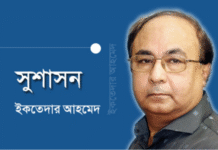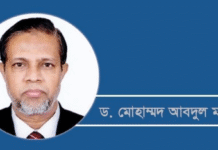
The role of professional journalists in making independent decisions has marked a rise over the last five years as 32.6 percent newsroom mangers now enjoy full freedom in news selection, says a new survey on the country’s journalist community.
In news selection, 32.6 percent (115 respondents) media professionals exercise their full freedom, 26.6 percent (94) enjoy a great deal of freedom, 24.1 percent (85) moderate freedom and only 2.8 percent (10) do not enjoy any freedom in selecting news stories, the survey says.
The survey, conducted during July-September 2013 among 353 professional journalists, comprising two editors-in-chief, 10 news editors, 23 shift-in-charge, 22 senior editors, 170 reporters, 46 sub-editors and 9 producers.
The respondents were from four divisions – Dhaka, Chittagong, Rajshahi and Khluna, three districts – Gopalganj, Rangpur and Mymensingh and three Upazilas – Jibonnagar of Jessore and Sitakunda and Mirsarai of Chittagong.
Three independent researchers – Rawshon Akther, Assistant Professor of the Department of Communication and Journalism, University of Chittagong (CU), ASM Abdul Haque, former Trainer of the Press Institute of Bangladesh and Mohammad Sahid Ullah, Associate Professor of Communication and Journalism, CU conducted the survey.
A total of 288 full-time media professionals, 47 part-timers and nine freelancers took part in the survey as respondents.
Among them, 187 are from daily newspapers, 57 from television channels, 29 from radio stations, 29 from news agencies, 19 from online news organisations and 32 from magazines and weeklies.
Journalists with working experience from six months to 37 years were included among 353 samples, whose average working experience is around 12 years.
Among those 6.5 percent (23) have been working for 10 years, 13.9 percent (39) for 4-5 years, 4.5 percent (16) for 20 years, 7 percent (25) for 12-13 years in various national, regional and local media outlets.
During the last five years, 33.1 percent (117) working journalists said that the competition among professional journalists has increased to a large extent and 41.4 (146) percent journalists have noticed a sharp increase of influence of advertisement on journalism.
Similarly, 34.0 percent (120) respondents noticed a growing importance of journalism education in the profession.
Responding to a question on which factor has most influence on the profession, 55.2 percent (195) indicated the journalism ethics, 35.7 percent (126) preferred personal values and beliefs, 35.4 percent (125) think editorial policy has high influence on the profession.
The other factors are editorial supervision (29.7 percent, 105 respondents), the competition from fellow media organisation (22.9 percent, 81 respondents), information access (21.5 percent, 76 respondents), censorship (20.7 percent, 73 respondents), owners of news organisation (18.1 percent, 64 respondents), and the managers of news organisation (15.6 percent, 55 respondents).
On political influence on the profession, 35.4 percent think politicians have no influence on the profession, and military, police, businesspeople have very little influence, according to the survey.
About credibility, around 15.3 percent respondents (54) think the credibility of journalists has decreased among people while 21.2 percent (75) feel it has increased.
But 30.0 percent (106) respondents consider that the credibility of journalism remains the same as before.
However, 36 percent (127) journalists consider the importance of journalism among general people has increased during the period.
Of the respondents, 257 journalists are working for a single media house, 58 for two and 13 for three media organisations at a time.
Among them, 72.2 percent (255) said they try their best to follow the professional ethics in practicing objectivity though many of them (19.5 percent) informed it is acceptable to set aside ethical standards if an extraordinary circumstance arises.
Some 55.5 percent journalists consider that increasing the tolerance among people is the key duty of the media professionals under the current context in Bangladesh society while 48.8 percent support national development and 46.4 percent intend let people express their views through their activities.
The survey has found that 46.6 percent journalists work as advocates for social change, 38 percent think they are analysts of current affairs, 30.0 percent try influencing the public opinion, 29.2 percent are monitoring and scrutinising political leaders and 23.5 percent journalists think they are detached observers of any event in practicing professionalism.
Source: UNB Connect









